A question that comes up from time-to-time… what sort of calculator can I use for my Foundation, Intermediate and Full amateur radio exam?
The wording from the RSGB paperwork (Booklet EX500 2016 edition) states as follows:
3.1 Silent, battery powered, non-programmable calculators are permitted. The Invigilators may provide spares but are not required to do so.
If you’re taking the exam online, you need a physical calculator, not the calculator on your computer, and not a smartphone calculator.
Foundation
For Foundation, the most complex formulas you’ll need to tackle are V = I x R and P = I x V
Any basic calculator will do the job here. I train with a local club and we provide candidates with a loan calculator for the exam. They cost £1 and came from one of the many High Street ‘Pound Shops’ out there. These are perfectly adequate, as a scientific calculator is not needed
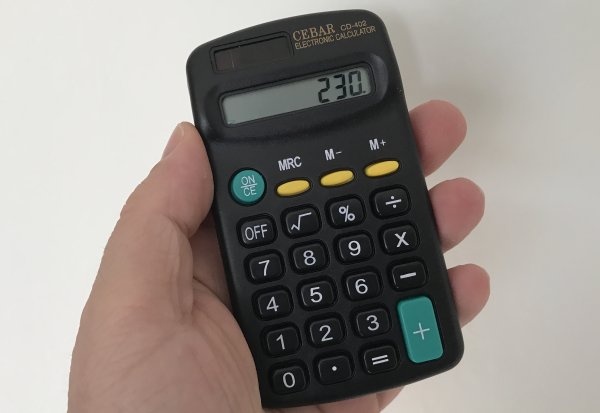
Intermediate
Formulas at this level do get slightly more complicated (but not much), and a scientific calculator is helpful (but not essential). A basic ‘pound shop’ one would do, but for peace of mind, a scientific calculator (just to help with exponents) makes sense.
Advanced / Full
A scientific calculator is a must. For the exam, you’re given a one-page list of formulas (so you don’t have to remember them all), and you will be given some formula questions. Here’s an extract showing a couple of the more complex formulas:
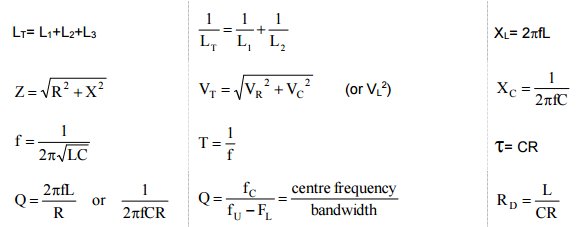
If formulas aren’t your thing, then I’d strongly advise getting a scientific calculator with a large screen that allows formulas to be typed in as seen, like this:
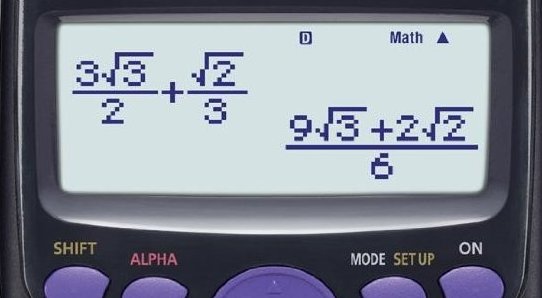
One that’s often recommended, and is featured in the RSGB’s Intermediate Licence book, is the Casio fx-85GT – This is available for around £10, and is ideal for all three licence levels. It’s non-programmable and allowed for use in GSCE and A level exams, making it fine for amateur radio exams.
Want an edge?
For a few pounds more, take a look at the Casio fx-991EX PLUS. This gets a five-star rating as the best calculator to go for, as it has a trick up its sleeve – the “SOLVE” button. Essentially, this allows you to type in an equation and put in an ‘x’ for the value you want to calculate. Press the “SOLVE” button, and wherever the ‘x’ is the formula, its value will be calculated. This calculator conforms to the requirements for UK school exams and is marketed as suitable for GCSE/A level, so this functionality is clearly not regarded as ‘cheating’.
Under “Using a Scientific Calculator” in the RSGB Advanced Licence booklet, there’s an example of calculating a resonant frequency. The Casio fx-991EX PLUS makes this a doddle – see below:
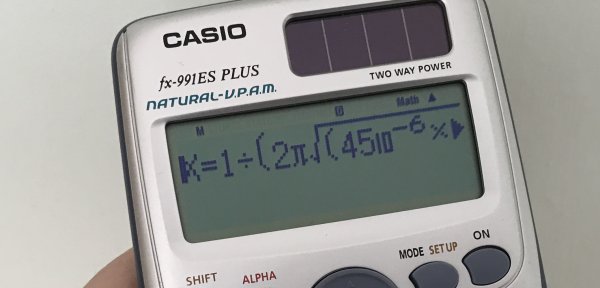
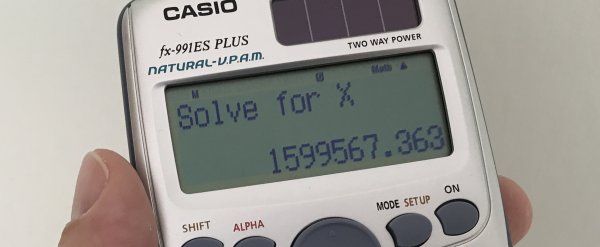
| What model of calculator is allowed for exams?
The RSGB don’t publish a list of approved / banned devices, and they simply state that calculators must be “silent, battery-powered and non-programmable”. Both the Casio fx-85GT and Casio fx-991EX PLUS mentioned on this page fit that category, and are marketed in the UK as suitable for GSCE and A/AS level exams (See fx-991EX Plus packaging). In February 2017, RSGB advised its tutors of the calculator guidance issued by the Joint Council for Qualifications (JCQ). They set the UK requirements for exams (including EdExcel and City & Guilds), and the JCQ’s published exam conduct guidance (2017) is clear: “Calculators must not be designed or adapted to offer any of these facilities: language translators, symbolic algebra manipulation, symbolic differentiation or integration, communication with other machines or the internet. Also they must not have retrievable information stored in them, including: databanks, dictionaries, mathematical formulas, text.” The two Casio models referred to, comply with those requirements and are OK for school use, so it’s hard to imagine that RSGB would have a problem with either model. Non-programmable? Programmable calculators are defined as calculators that can automatically carry out a sequence of operations under control of a stored program (much like a computer). Typically these allow programs to be installed via USB or an SD card. Calculators with a memory function are fine. Mobile phone calculators? No. RSGB Rule 3.2 states that:“All mobile telephones, smart watches and other electronic items (other than a calculator) must be switched off and deposited in a secure place so as not to be accessible during the examination.” |
Any questions? Please ask below.



I’m on the BBDL course and waiting to hear if the Casio fx-991EX PLUS is allowed in the exam.
I hope it is because it makes life so much simpler when transposing a formula.
Hi Rob,
The RSGB’s requirement only states that a calculator must be silent, battery-powered and non-programmable. The FX-991ES Plus conforms to all three of these requirements.
In February 2017, RSGB provided guidance to tutors, referring to the Joint Council for Qualifications (JCQ) guidance on calculators. JCQ provide guidelines for the likes of AQA, City & Guides, EdExcel, OCR, Pearson and other exam bodies. The guidance lists clear criteria, and the FXT-991ES Plus meets all of these. It’s even recommended by one exam body. In the UK, the FX-991ES Plus is sold on the high street with a sticker saying “Recommended for GCSE, AS & A Level”
According to online documentation, the 991ES uses the “Newton-Raphson numerical method” to solve equations (which is not algebraic manipulation), so would appear to be acceptable under JCQ requirements
If, as stated in 2017, RSGB is happy with JCQ’s guidelines, then as the FX-991EX Plus conforms and can be used for mainstream UK exams, I personally can’t see any reason why RSGB would not allow this particular compliant Casio model. I’d find it very hard to imagine the RSGB would go against JCQ / EdExcel/C&G policy on allowable calculators, but you never know. Please let me know what your tutor advises.
Pete
There is an updated version of that calculator now, known as the CASIO FX-991EX
It’s cheaper than the old Plus model and still has the solve button and is still recommended for UK exams. 🙂
https://www.amazon.co.uk/FX-991EX-Advanced-Scientific-Calculator-VERSION/dp/B0719FWP3X/ref=sr_1_3?dchild=1&keywords=Casio+fx-991EX+PLUS&qid=1590917715&sr=8-3
Sad that HP 35S does not strictly fit the requirements. I have to buy a casio just for the test, but it does not support RPN, and I am really struggling to use it.
Hi, I passed foundation with your online course.. Very happy. Moving onto intermediate now and see this successor model
Casio FX-991CW
Will that be ok?
73!
M7KFN